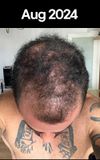Skin Changes on the Face Caused by Over-The-Counter Cosmetic Creams: An Observational Study of Clinical and Dermoscopy Features
January 2023
in “
Indian journal of pharmacy practice
”
Topical Corticosteroids Hydroquinone Topical Steroid Damaged/Dependent Face Exogenous Ochronosis diffuse red dots brown globules terminal hair vessels white structureless areas focal atrophy of the epidermis focal parakeratosis dilated capillaries erythrocyte extravasation perivascular infiltration perifollicular infiltration TCS HQ TSDF EO
TLDR Over-the-counter cosmetic creams can cause skin damage on the face that is visible under dermoscopy and confirmed by tissue analysis.
This observational study evaluated the clinical, dermoscopic, and histopathological features of skin changes on the face caused by over-the-counter cosmetic creams, specifically Topical Corticosteroids (TCS) and Hydroquinone (HQ). Conducted at a tertiary care hospital, the study included 70 patients with signs of Topical Steroid Damaged/Dependent Face (TSDF) or Exogenous Ochronosis (EO). Key dermoscopic features observed were diffuse red dots (94.28%), brown globules (84.3%), terminal hair (88.6%), vessels (90%), and white structureless areas (61.43%). Histopathological analysis revealed focal atrophy of the epidermis, focal parakeratosis, dilated capillaries with erythrocyte extravasation, and perivascular and perifollicular infiltration. The study highlights the correlation between dermoscopic and histopathological changes and emphasizes the need for awareness regarding the long-term adverse effects of TCS misuse.



